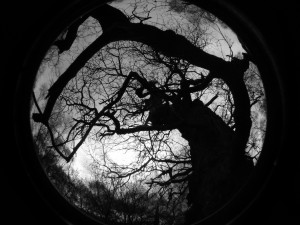![dan_wells[1]](http://www.fictorians.com/wp-content/uploads/2014/02/dan_wells1-215x300.jpg) A guest post by Dan Wells.
A guest post by Dan Wells.
I sold my first book about a year and a half ago, and I was bouncing off the walls more literally than you probably care to imagine. It the was the first step in the fulfillment of a life-long dream, and I was so happy I couldn’t stop telling pretty much everyone I knew or met or interacted with. I quickly learned there were only two basic versions of this conversation.
The Good One
Me: I just sold a book! I’m going to be published!
Other Person: That’s awesome!
Both of Us: Yay!
The Other One
Me: I just sold a book! I’m going to be published!
Other Person: That’s awesome! What kind of book is it?
Me: Horror.
Other Person: I don’t read horror.
This basic template held true in almost every situation, including–and this surprised me–dedicated genre fans. People who have read more fantasy and science fiction books than most people have ever read anything. The thing is, there’s a lot of crossover between the rest of the speculative genres: if you read fantasy, you probably also read a bit of SF, and a bit of paranormal, and a bit of historical, and so on and so on. There are exceptions, and most of us tend to group around one or two subgenres that really get our motor going, like hard SF or cyberpunk or urban fantasy or whatever, but horror, for most of us, is the odd one out. Except for a relatively small group of self-identified horror fans, nobody reads it.
Except that everybody reads it, they just don’t admit it, or maybe even know it.
Ask people what horror is and you’re likely to get one of two answers: “Stephen King” or “slasher movies.” Never mind that Stephen King hasn’t written a full-on horror novel in decades, or that slasher movies are in a medium so removed from novels as to make the comparison meaningless. These are what people think of when they hear the word “horror,” and that colors their entire perception of the genre. Our concept of horror is frozen in a single period of history, let’s call it 1973 (the publication of Carrie) to 1988 (when movies like Child’s Play represented the last hurrah of the slasher movie before they tipped fully into self-parody). Horror films have never truly left, because they’re cheap and profitable, but their quality and popularity have gone in waves; I count two horror film renaissances since the heyday of the 80s, maybe three depending on how you define them. But horror novels have never achieved anything like their 15-year peak, possibly because of the way the giants of that era (King, Dean Koontz, Clive Barker, James Herbert) so thoroughly dominated the genre.
And the truth is, this shifting definition is kind of correct, in its way: if we define “horror” as “the kind of stuff King and Herbert wrote in the 70s,” then you’re right, most people don’t read horror anymore, and that’s fine because most people don’t write that kind of horror anymore. The genre has moved on, and King and Koontz and Barker and a giant host of others are still writing it, but the genre label is still stuck in the past. Today we hide our horror in a jumbled pile of other labels, secretly infecting almost every shelf in the bookstore. Chelsea Quinn Yarbro writes “vampire historicals,” but they’re really horror. Jim Butcher’s Harry Dresden books are “urban fantasy,” but they’re really horror. Carrie Vaughn’s Kitty Norville books are “paranormal romance,” but surprise, they’re really horror. F. Paul Wilson writes “thrillers” that are obviously horror. These books and more are incredibly popular–Dresden got it’s own TV show and roleplaying game, for goodness sake–and the odds are incredibly good that the same people who claim they never read horror will, when pressed, admit that they’ve read a lot of these other things. They just don’t call them horror, and the bookstores don’t call them horror, and thus horror doesn’t sell and thus the myth perpetuates.
Trying to tie horror down to a single genre or representation is missing the point. Some say that horror is defined by its supernatural elements, but I think horror goes beyond the trappings and the props to get at something much deeper and more meaningful; it’s less of a genre, in my mind, than a style or a perspective. Let’s go back to the roots of modern horror and steal a definition from H.P. Lovecraft: “The oldest and strongest emotion of mankind is fear, and the oldest and strongest kind of fear is fear of the unknown.” So we could say that horror is about fear, and in that sense we can find horror everywhere. In military fiction much of the plots are driven by the uncertainty of who will live and who will die; they’re about the fear of death and the loss of honor; they’re horror. Espionage novels are about the fear that an enemy nation will subvert or conquer your own, literally stealing your way of life; that’s horror. Romance, at it’s heart, is about the fear that the person you love doesn’t love you back; that’s one of the most horrific things I can think of.
So what separates these genres from “real” horror, whether we label it as such or not? Let’s go back even further to Anne Radcliffe, the original godmother of gothic horror; roughly paraphrased, she separated terror and horror in a fascinating way, saying that terror is the emotion we feel while waiting for something bad, and horror is the emotion we feel while facing it. Terror is about dread, but horror is about confronting the thing that we dread–it’s about our revulsion, our shock, our struggle to understand and adapt. In a thriller we race the clock and stop the bad guy, but in a horror, the bad guy wins: the bomb goes off, or the protector dies, or the true love marries someone else. We have to pick up the pieces and survive. Horror is about facing our losses head on, and being either crushed or strengthened by your reaction to it.
In light of this definition, we can see the rise of horror in all our media, from The Hunger Games to Man of Steel. We are a society that has faced true horror (9/11 is the obvious one, plus any number of other terrorist attacks, military actions, mass shootings, and so on), and we’re dealing with those emotions and repercussions in our art. We are primed for horror, because we are searching for stories about survival. This, in turn, makes us a culture primed for heroism: we’ll face the horror, and we’ll live through it, and even if the characters die the readers will still be there at the end, breathless and alive and shaking our head in relief. Horror gives us a chance to overcome the things that try to break us.
Horror is everywhere. Go out and make some more of it.

 I admit up front that I don’t read much Horror. It’s not that I don’t like the stories or the work as a whole, it’s just that it makes me uncomfortable. And it’s supposed to, that’s its entire job! A good horror novel will take you through an emotional journey no other genre does. It elicits emotions of fear, confusion, pain, angst, and sorrow. All novels attempt to play with your emotions to some degree, but few attempt to do so in a way that is supposed to make you uncomfortable.
I admit up front that I don’t read much Horror. It’s not that I don’t like the stories or the work as a whole, it’s just that it makes me uncomfortable. And it’s supposed to, that’s its entire job! A good horror novel will take you through an emotional journey no other genre does. It elicits emotions of fear, confusion, pain, angst, and sorrow. All novels attempt to play with your emotions to some degree, but few attempt to do so in a way that is supposed to make you uncomfortable.